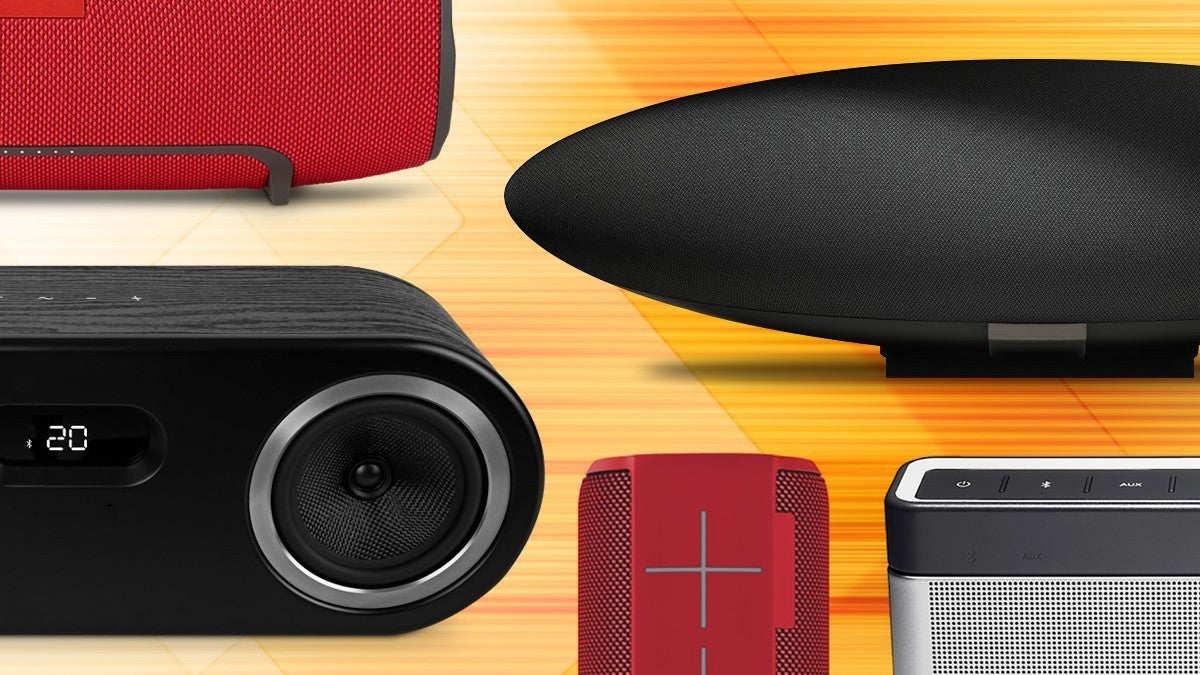
There was a time when Bluetooth speakers were like jelly beans: They were cheap, they all looked the same, and they were invariably of dubious quality. Times have changed. Every major audio manufacturer has at least one model on the market today, and most have several. If you haven’t listened to a Bluetooth speaker lately, you’re in for a very pleasant surprise.
But the industry’s progress doesn’t mean that every Bluetooth speaker justifies its price tag, no matter how inexpensive it might be. There’s still plenty of dreck floating around. Don’t worry, we’re here to help you steer clear of the junk and point you to the best speakers at the price range that fits your budget. To that end, we’ve picked the best Bluetooth speakers in four broad price ranges: budget, mid-range, high-end, and–yes, there are ultra-high-end Bluetooth speakers–price is no object.
Our reviews go into some depth, so we encourage you to follow the links to read them in their entirety. You’ll also find a guide to the most-important features you should look for in your next Bluetooth speaker, as well as links to the rest of our latest Bluetooth speaker reviews, at the bottom of the page.
Our recommendations will change over time as new products come in for testing.
- Best budget Bluetooth speaker: Aukey SK-M12
- Best mid-priced Bluetooth speaker: Creative Sound Blaster Roar 2
- Best high-end Bluetooth speaker: Bowers & Wilkins Zeppelin Wireless
- Price is no limit Bluetooth speaker: Naim Audio Mu-so
- Features to look for in a Bluetooth speaker
Best budget Bluetooth speaker: Aukey SK-M12
You might not be familiar with the brand, but you won’t complain about the feature set or the quality of sound this little portable speaker puts out. You can use it as a speakerphone; it has a threaded mount hole so you can attach it to a tripod or clamp it to your bicycle’s handlebars with a third-party accessory; and it’s weatherized to withstand the elements.
About the only feature it’s missing is the ability to operate in tandem with a second SK-M12 to deliver stereo sound. But for the price—and the sound quality—that’s a limitation we can live with.
Budget-priced runner-up: Altec Lansing Lifejacket III
The Altec Lansing brand is as storied as the Aukey brand is unfamiliar. Risk-averse readers might prefer our runner-up pick in the budget category, even if the Lifejacket III does cost twice as much as our top pick. Another point in Altec Lansing’s favor: The manufacturer gives this speaker an IP67 rating, which means it’s immune to dust ingress and can withstand being fully submerged in up to one meter of water for 30 minutes.
Best mid-priced Bluetooth speaker: Creative Sound Blaster Roar 2
Creative’s speaker isn’t as portable or weatherproof as some of its competitors in this or other price ranges, but it might be the most versatile Bluetooth speaker at any price. Not only can you pair it to smartphone with a tap (provided your smartphone supports NFC), but you can hardwire it to your computer and use it as a digital-to-analog converter and speaker, bypassing your computer’s noisy electronics.
This speaker can pull music from a USB storage device, a microSD card, or an analog audio source. It supports the aptX codec and in addition to operating as a speakerphone, its mic canrecord your phone conversations using either its onboard mic or a Bluetooth connection. We call it the Leatherman of Bluetooth speakers.
Mid-priced runner up: Ultimate Ears Megaboom
Here’s another Bluetooth speaker that can withstand the elements. The Ultimate Ears Megaboom boasts an IPX7 code, which means it’s rated to withstand submersion in up to three feet of water for a full 30 minutes. But it doesn’t make this list for that reason alone. This speaker delivers sound that will fill the typical backyard. It doesn’t have all the versatility of the Roar 2 described above, but it will be the life of the party.
Best high-end Bluetooth speaker: Bowers & Wilkins Zeppelin Wireless
Bowers & Wilkins has never failed to impress us, but they’ve long been associated with Apple having entered the all-in-one speaker market with the Zeppelin iPod dock. That changed with the third-generation Zeppelin, the Zeppelin Wireless, which lost the physical dock in favor of Bluetooth, Wi-Fi, and Apple’s AirPlay technology.
B&W didn’t stop with Bluetooth. They also opted to support the aptX codec to deliver the highest quality audio that Bluetooth is capable of delivering. And if you’re a Spotify subscriber, you’ll appreciate this speaker’s support for Spotify Connect. The one down side: B&W stubbornly refuses to develop an Android app. But that’s a minor inconvenience that will bug you only when during first-time setup.
High-end runner-up: Mass Fidelity Core
The product of an incredibly successful crowd-funding campaign, Mass Fidelity’s Core wowed us with it uncanny ability to produce a stereo image no matter where you’re sitting—or standing—in the room. This speaker is also incredibly powerful for its diminutive dimensions, and you can add a wireless subwoofer if you want more low end. You can also wirelessly network up to eight Cores for a multi-room audio system, though Apple fans might be disappointed to learn that AirPlay is not supported.
Price is no limit Bluetooth speaker: Naim Audio Mu-so
You should expect a lot at this price, and Naim Audio doesn’t disappoint. This speaker is larger and more powerful than B&W’s Zeppelin and like that speaker, it gives you just about every option you could ask for: Bluetooth, of course (with both Android and iOS apps), but also Wi-Fi, AirPlay, hardwired ethernet, a USB port, 24/192 support, Spotify Connect, aptX, optical digital input, and multi-room audio support with other Naim components. And the sound? Exquisitely precise.
Features to look for in a Bluetooth speaker
Not convinced the picks we’ve listed above are exactly right for you? This guide will help you sort through the facts, figures, and specs to determine which speaker will best meet your needs. Your first decision will be to choose between mobile and stationary form factors. The majority of Bluetooth speakers are portable because they get paired with mobile phones, but more and more manufacturers are introducing models designed to remain inside the home.
Choosing a portable model gives you the best of both worlds in some respects, but a stationary speaker is more apt to blend into your home’s decor. And while we’ve heard some pretty spectacular portable Bluetooth speakers, a plug-in model is more likely to produce the sound you’re looking for if fidelity is priority one in your book.
Here are the features you’ll want to evaluate in a Bluetooth speaker:
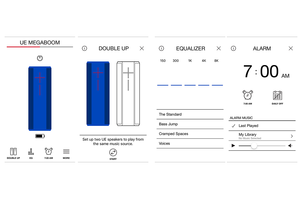
Theo Nicolakis
App support: Companion apps can provide lots of additional features to a speaker that wouldn’t be possible with just physical buttons on the speaker itself. The app might enable more than one person to be the DJ, queuing up songs to play on the speaker. An app might enable you to create customized EQ curves for different styles of music, create wake-up alarms, or power the speaker on and off remotely.
aptX support: Bluetooth audio must be squeezed down in order to stream over the airwaves, and the default codec use lossy compression that throws some of the musical data away. Qualcomm’s aptX codec is lossless, so none of the musical detail is lost in the process. But aptX must be present at both ends of the stream, in the playback device and in the speaker. Most Android devices support aptX, but Apple devices do not.
Battery: Next to fidelity, a portable speaker’s most important feature is how long it can operate when it’s not plugged into the wall. You should expect a battery to last 10 to 20 hours, but remember that the bigger the battery, the heavier the speaker will be.
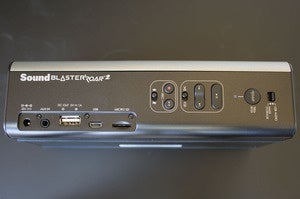
Michael Brown
Charging options: If your speaker has a battery, it will need to be charged. Speakers that charge their batteries via a USB port are more convenient than models that require an AC adapter, but larger batteries might not offer that option. Some speakers also let you plug in a USB cable to tap their battery to charge your smartphone.
DSP: An onboard digital signal processor (DSP) lets you electronically change how the speaker is driven in order to compensate for speaker placement or the acoustical properties of your room, among other things.
Mounting options and accessories: A portable speaker should be easy to take with you. While some Bluetooth speakers count on their size to make them easy to grip, others provide a lanyard, carabiner clip, or a shoulder strap. It’s even more handy when the manufacturer provides standardized sockets and accessories for mounting the speaker to an object, such as your bike’s handlebars.
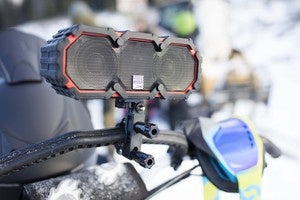
Altec Lansing
Some portable Bluetooth speakers are small enough that you can grip them in your hand, but it provide thread mounts so you can attach them
Speakerphone: Some Bluetooth speakers have built-in microphones that enable you to use the speaker as a speakerphone in concert with your smartphone. The sound quality will be much better than what you’ll get from your phone, and you’ll be able to turn the volume up much higher. This can be very handy for conference calls.
Stereo pairing: Some speakers let you create a left/right stereo pair with two speakers (this works best, of course, when the two speakers are identical).
Weatherization: Portable Bluetooth speakers can be used indoors and out, so the best models provide some protection from the elements. Ideally, the manufacturer will let you know just how much protection you can expect by providing an IP (International Protection) marking. The first digit rates the enclosure’s protection from particulate matter (e.g., dust) and the second digit rates its protection against liquids.
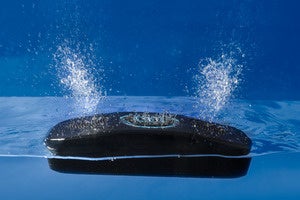
An IP64 code, for instance, indicates that the speaker is completely protected from dust (6) and from water splashed onto it (4). The higher the numbers, the more protection you can expert If either digit is replaced by an X—IPX4, for example—the code indicates that the speaker isn’t rated for protection from particles (this doesn’t necessarily mean that it’s not protected from things like dust, just that the manufacturer doesn’t rate its protection).
Wi-Fi: Higher-priced Bluetooth speakers also provide the option of connecting to your Wi-Fi network, so that you can stream music from a NAS box. Wi-Fi streams will offer higher fidelity than Bluetooth, even if the speaker supports the aptX codec. A speaker that provides for a hardwired network connection is all the more versatile.
Wireless range: A Bluetooth speaker’s range depends on the power class of its radio, and it can vary widely and is impacted by the environment that it’s operating in. A Class 1 radio offers range of approximately 100 meters, but the number of walls between the Bluetooth source and the speaker and the type of materials in those walls will have a significant impact on range. It’s much easier for radio waves to pass through drywall than masonry, for instance. Objects in the signal path, such as large metal appliances, will reduce that range even further
source”cnbc”




